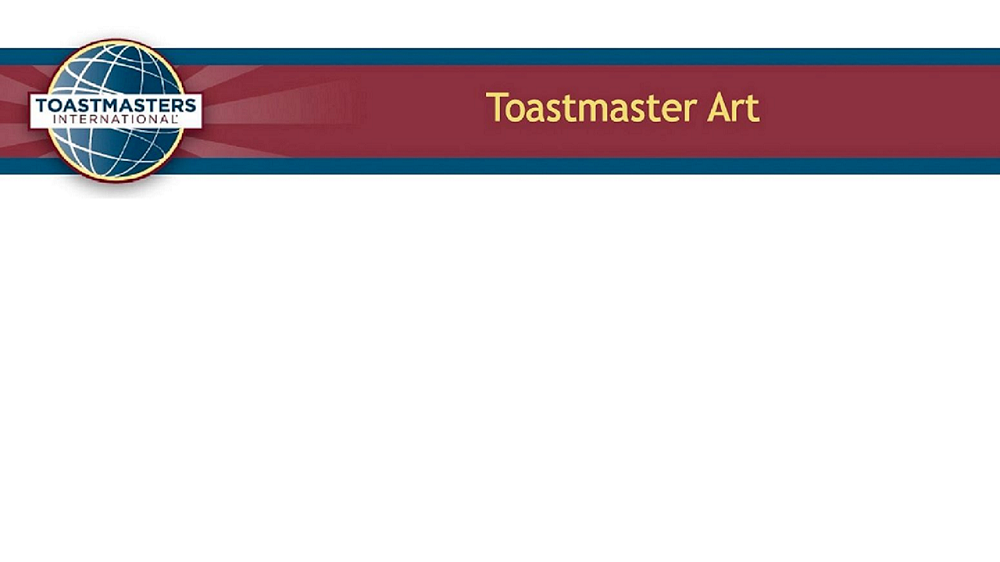Contest Organizer,
Have you heard one or more of the following announcements at the start of a Toastmasters speech contest?
- No photographs to be taken during speeches.
- No filming or recording allowed.
- If you wish to record a speech contest, all speakers or presenters must beforehand give their written permission to be recorded.
- If a recording is made, the person making the recording must provide a copy at no cost to all contestants who request one.
I certainly have, predominantly at district-level contests, and since they all seem “official” and are reasonable, I added these announcements to those made by the sergeant-at-arms as he started the contest at the area and division levels when I was the area director and division director (and also contest chair). I assumed that they should be incorporated into the contests at the club, area, and division levels.
I assumed incorrectly.
Like any Toastmaster seeking the “final answer” for a contest question, I turned to the Toastmasters International Speech Contest Rulebook. Guess what? Those announcements are not in there. Not one of them. In fact, the Rulebook is entirely silent on this matter.
Like any Toastmaster seeking the “final answer” for a contest question but not finding it in the Rulebook, I phoned Toastmasters International (admittedly #2 on my speed dial list!) I shared my dilemma and asked for the official position. The answer was not what I expected, but it was short and simple:
- Districts set the guidelines at their contests.
- At the lower (club, area and division) contests, the contest organizer decides whether or not a video recording may be made.
It’s entirely up to you, the contest organizer, to determine the rules at your contest governing the making of recordings.
Lest I end this article with a length of merely three hundred or so words–which is definitely not my style!–I shall share a few suggestions as you decide what you are going to do about recording at your next contest. Let us review the four announcements shared above.
First, can we agree that whether the photographer is stationary (either standing or seated) or moving about, it is distracting to a speaker to have someone taking photographs during his speech? Even if there is no shutter sound or flash bulb involved, the potential for distraction is present.
Second, should filming or (audio) recording be allowed? At a recent district conference, there was a fellow off to the side with a video camera on a tripod. As I recall, he moved little, simply keeping the camera focused on the stage to record the speeches. While I as a contestant might be a little unnerved by looking out and seeing a camera pointing at me, is that any more unnerving that looking out at a room full of people? What about members of the audience holding up cameras and (nowadays) phones?
Third, what about seeking permission, written or oral, from all contestants prior to the contest? In the age of Big Brother, with its myriad of cameras and spy satellites, one finds it hard to avoid being filmed in the normal course of life. Businesses, banks, and (certainly) government offices all have many cameras present, and they don’t ask for our permission with regard to recording, but we are talking here about our controlled environment, a Toastmasters contest, so we need not be as crass as those institutions. If I, as a contestant, don’t want to be filmed, is it not proper that my request be heeded? Conversely, maybe I do want to be recorded, so that I can take the recording and analyze my performance, so that I can post it to my YouTube channel or club’s Web site. Can’t I have someone at least record my performance in the contest?
Fourth, should a copy of a recorded contest be made available at no cost to all contestants? As a contestant, I could see myself wishing to have a recording of the whole contest, to see how I did compared to the others, but is the person approved to make a recording going to be compelled to provide, at his cost, copies to any contestant who asks for one?
As contest organizer, you need to consider these things, and well in advance of the contest. Why? If you are going to allow someone to record the entire contest, you’ll have to make arrangements with him to have his equipment set up in advance, advise him that he should not be a distraction, let him know of your decision regarding provision of copies to contestants, etc. If you are going to require that all contestants agree to be filmed, you will also need to communicate with them, and before–not the day of!–the contest.
Again, it’s entirely up to you, the contest organizer, to determine the rules at your contest governing the making of recordings. Here’s how I believe I’m going to try it next time I’m a contest chair. Using again the numbering of the announcements above:
- Prohibit photographs during speeches, as photo opportunities exist at the end of the event.
- Allow one person to make a video recording of the event, provided this is all set up in advance.
- Seek in advance the consent of all contestants to be recorded. If any say “no,” I will decide if that means that none shall be recorded (thus eliminating entirely the need for the photographer), or if only those giving their consent will be recorded.
- Since we’re no longer in the VHS days and DVDs and digital copies are inexpensive or no-cost, require that the photographer provide a no-cost copy of the recording to all interested contestants.
I hope this has been of help to you. Organizing and conducting a well-run contest can be difficult, harrying, frustrating, maddening, or a combination thereof. Proper and organized actions prior to the contest can reduce your stress, so I encourage you to incorporate the above into your pre-contest planning to ensure that when it comes to the photographic recording aspects of the event, there’s no additional hassle to deal with. After all, we want our contests to above all be fun, right?

